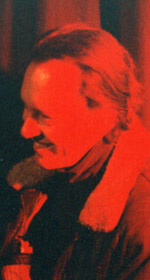In conversation With Richard E.
The Observer Magazine – 1999
Eoin Cunningham engages in a frank exchange with the perfumed ponce…
On Friday, January 29th, the L&H, in one of its uncharacteristic moments of student-friendly publicity, booked Richard E. Grant for a public interview with Dave Fanning. You all know this, mainly because it seemed that 80% of Belfield was inhabiting theatre L at the time, but there’s more. Your trusty Observer, in a typically spontaneous and frankly exciting move, sneaked in for a few words with the man himself before the main show.
Half an hour before the scheduled interview, Grant appears, looking taller in real life, which as most people will attest, is unusual for a film star. An interviewer for TV3 beckons, and our guest politely sits and begins the round of questions which will dominate the next 3 hours or so of Richard E. Grant’s life.
After the fiftieth question about Withnail and I, every journalist in the room starts to realise that the way into this star’s heart is not by quoting “Fork it!” at him.
Finally, the TV3 presenter, with a black hole where grey matter should be, ends her ruthless probing: “Is it fun being a movie star?” and so on; which leaves Grant free to be hustled for a few words by the editors and yours truly.
We get off to a good start (“Don’t call me Mr. Grant, call me Richard, I don’t want to feel old.”)
In person, Richard E. Grant is not remotely like any of the many characters he has played over the years. The most one can say is that he looks similar to them. Resplendent in a Californian tan, and the sort of movie star fashion sense that believes that leather trousers have a purpose outside Harley Davidson ads and The Torture Garden, it is only when he opens his mouth that Richard E. Grant, the perfumed ponce extraordinaire, appears.

As he has recently returned to the small screen (to play the Scarlet Pimpernel, fact fans), I boldly ask him if he has any interest in sliding further down the ladder towards the stage.
“I have no desire to return,” comes the answer, quickly adding that only a new play would rouse him from his slumber, since he can’t be having with all this Shakespearian twaddle.
When asked about how he picks a film, especially after the likes of Hudson Hawk and Pret-a-Porter are noted, Grant is refreshingly free of arrogance and seems eager to blow these turkeys from the water before I do.
“I have no mixture, no gameplan. The best script may often be a low-budget, independent.”
It later transpires, following his immediate acting duties, working with Patrick Stewart, for example, Grant is working on a small, low budget indie film of his own.
Finally, noting the limited time Mr. Grant and I have together, I ask him about his experiences in Hollywood. From his film diaries, “With Nails”, I have divined that tinseltown is even more fantastically left-of-field than it appears, and am now frankly dredging for more gossip. Grant, ever the gentlemen, demures.
“Well, I’m more cynical, but equally still star-struck. Walking through Hollywood, I am now sure that you’ll see more famous people in half an hour than anywhere else on the planet.”
No, he will not participate in throwing mud at others’ careers, much to the disappointment of my shallower side. Before I go, naturally the celebrity overcomes me totally, and I’m powerless to prevent myself from passing him a copy of his book, which he signs with a very good grace.
Leaving, I feel compelled to ask Our Hero for advice about making it for the hopefuls out there in Belfield –
“You’ll always meet people who tell you you will never make it. You’re too fat, too skinny, too tall or too small… fuck ’em.”
And like that, he was gone.




